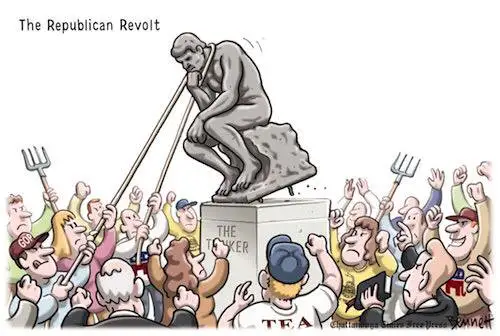This July Fourth will likely be a bleak one

As July 4 approaches, I feel myself in mourning. I grieve for my country and worry for the nation that my children and grandchildren are inheriting.
Unless something dramatic intervenes, we face a difficult choice in the fall presidential election. We elect a man who is decent, moral and right on his policies, but whose diminished capabilities will only decline further. Or we pick a man who has said he’d be a dictator (perhaps for more than just a day), whose personal morality is that of “an alley cat” (as his opponent memorably said), and who promises to sow chaos in government, domestic civil society and foreign affairs.
This is a Hobson’s choice, of course. The second route surely leads to disaster. But the first, the road we should take, spawns uncertainty, fear and doubt. Could we count on President Biden’s aides, colleagues and advisers to make sure he manages the reins of power well? Certainly, we could expect the seemingly more vigorous Trump to clutch and pull at such reins to monstrous effect, doing even more damage than such moves as packing the Supreme Court and lower courts has already done.
Yes, Biden’s deterioration is on full display these days. Without a teleprompter, he is at sea, a worrisome thing in a man who will need to deal with grave threats from abroad and mystifying polarization at home. It’s no wonder he’s lost the support even of longtime friends and loyalists.

But Trump needs no electronic aids to showcase his bigotry, divisiveness, self-interest and ignorance. He need only to deliver his erratic and rambling speeches, ones in which he claims that “Catholics are being persecuted,” that people will be arrested if they say they “answer to God in heaven,” that terrorists “in record numbers” are coming over our borders, that Social Security and Medicare are “being destroyed,” that his conviction by a jury on 34 felony counts was a politically motivated “show trial,” that the 2020 election was “rigged.”
Trump’s claptrap, dishonesty and demagoguery are extraordinary. Out of sheer opportunism, this longtime huckster paints a dystopian picture that seems to sell. Never mind that unemployment continues to be at record lows, that government spending has led to improved roads, bridge and transportation systems around the country, that inflation is subsiding. Never mind that the reason the border continues to be a problem is that Trump, desperate for an issue to run on, deep-sixed a plan backed by conservative legislators that would have fixed it.
And what would the man do if he ousts Biden? As The New York Times reported, he would step up the trade war that already is riling global relations, imposing stiff tariffs that will drive up prices on broad ranges of goods for Americans. He would set up WWII-style detention camps to hold rounded-up migrants for mass deportations, try to end birthright citizenship, use the Justice Department to persecute his enemies, strip employment protections from tens of thousands of civil servants, purge intelligence agencies and other bodies of people whose work he dislikes, and he would cut taxes for wealthy friends, driving up the national debt anew.

And all that is just for starters. Trump would also further pack the Supreme Court and the judiciary with untalented ideologues who could wreak damage that no successor could undo. In foreign policy, he would greenlight Vladimir Putin’s expansive ambitions and embrace and embolden dictators in other places, such as Hungary and, perhaps, North Korea. He also might try to overturn a constitutional amendment so he could seek a third term to impose even more chaos.
I mourn the passing of the party of Dwight D. Eisenhower, Ronald Reagan and George H.W. Bush, men with whom one might disagree but who were patriots committed to doing right by the country, not desperately seeking to salve damaged egos and shield themselves from prosecutions. I miss such aides as trade advocate Clayton K. Yeutter, whose actions enriched both the U.S. and much of the rest of the world. In his place, we have convicts such as Steve Bannon, Peter Navarro and Roger Stone, as well as extremists such as Stephen Miller.
We, of course, also have a long list of former Trump lieutenants who now disavow the man, including his own former vice president, who has declined to endorse him. Trump’s ex-chief of staff, former Marine Corps Gen. John Kelly, said his ex-boss is “a person who admires autocrats and murderous dictators” and “has nothing but contempt for our democratic institutions, our Constitution, and the rule of law.” Think Jan. 6, if you doubt the last point.
Indeed, Trump is a man who memorably mocked former POW and GOP presidential contender John McCain, saying “I like people who weren’t captured.” He ducked military service by faking a bone spur and more recently called fallen soldiers “suckers” and “losers,” as noted by Kelly.
As the nation’s first felon-in-chief, Trump would surround himself with toadies determined to march in lockstep with him, no matter the legal impropriety. They include potential vice presidential candidate Marco Rubio, who once called Trump a “con artist” but who now endorses him, and Sen. Ted Cruz, who once labeled Trump “utterly amoral” but now backs him.
And while Biden’s acuity is likely to decrease, Trump’s mental challenges have long been on sorry display and appear to have worsened. As his rambles have suggested, he seems deeply unwell. A Biden operating on fewer cylinders surely would be less of a danger than a rampaging Trump.

So, I grieve for my country. The only thing that gives me heart is that it’s possible American voters will make the right choice. Indeed, perhaps Biden will make it easier by stepping aside, clearing the way for a more vigorous person with similar sensibilities and sanity (though all indications so far are to the contrary). It’s possible that my fellow citizens will repudiate the corrupt and ideologically blind GOP of the Boeberts and Greenes. It’s possible that they will see through the party’s leading conman’s games.
But it’s hard at this point to be optimistic. Will the disaffected, gullible and ill-informed among our voters have their day? Will those rule who are taken in by slick TV-friendly imagery, who don’t school themselves beyond that? Will a minority of the nation again choose a would-be-tyrant thanks to a flawed Electoral College system? Recall that Trump won with just 46% of the vote in 2016.
If one can invoke Revolutionary War history, there were times when the cause seemed lost back then. Generals stumbled, turncoats betrayed their leaders, soldiers deserted. Yet, somehow the patriots prevailed. Can that happen again? Can dawn break after this darkening stretch? For now, it seems a long way off.









